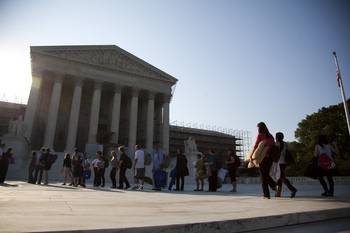U.S. Supreme Court sends Fisher vs. University of Texas affirmative action case back to lower court
- Related coverage: U-M law professor says U.S. Supreme Court's ruling reaffirms status quo on affirmative action
The U.S. Supreme Court ruled in a 7-1 decision Monday morning to send a case that could have affected the University of Michigan's affirmative action polices back to a lower court for reconsideration.
Before the Supreme Court Monday was the Fisher vs. University of Texas affirmative action case.
The case is a challenge to the University of Texas’ admission policy by a white student, Abigail Fisher, who was denied undergraduate admission. The Fifth Circuit court, as well as a lower district court, both upheld the university’s policy.

The U.S. Supreme Court in Washington, D.C.
Evan Vucci | The Associated Press file photo
“The Fifth Circuit must assess whether the University has offered sufficient evidence to prove that its admissions program is narrowly tailored to obtain the educational benefits of diversity,” according to the written opinion issued by the court Monday.
Justice Anthony Kennedy delivered the opinion of the court, while Justice Ruth Bader Ginsburg was the sole dissenting opinion. Justice Elena Kagan did not take part in deciding the case.
The University of Texas’ affirmative action policy was possible as a result of the court’s last major ruling on affirmative action -- a 2003 case out of the University of Michigan, Grutter vs. Bollinger.
In Grutter, the Supreme Court reaffirmed that universities could use race as an admissions factor when selecting incoming students.
Justice Clarence Thomas said Monday he would have overturned the court's 2003 ruling, the Associated Press reported.
The University of Texas automatically offers admission to the top 8 percent of Texas high school students per state law, the Associated Press reported.
For students who don't qualify for automatic admission, race is used as one of many factor to evaluate applicants.
University statistics indicate that more than eight in 10 African-American and Latino students who enrolled at the main campus in Austin in 2011 were automatically admitted, the Associated Press reported.
A 2006 voter-approved constitutional amendment, known as Proposal 2 or the Michigan Civil Rights initiative, bans the consideration of race in admissions in Michigan’s 15 public universities.
The Supreme Court is expected to consider the constitutionality of Proposal 2 in its next term in the case Schuette v. Coalition to Defend Affirmative Action.
Amy Biolchini covers Washtenaw County, health and environmental issues for AnnArbor.com. Reach her at (734) 623-2552, amybiolchini@annarbor.com or on Twitter.


Comments
Bcar
Mon, Jun 24, 2013 : 6:35 p.m.
racism is racism. Except in Ann Arbor.
arborarmy
Mon, Jun 24, 2013 : 6:48 p.m.
You, apparently, don't know the meaning of the word. Check out a dictionary.
Mick52
Mon, Jun 24, 2013 : 4:46 p.m.
One important pat of the UM v Grutter ruling that almost everyone ignores is that racial preference should be temporary. Justice O'Connor noted: "We expect that 25 years from now, the use of racial preferences will no longer be necessary to further the interest approved today." So by 2028 this ruling should expire but that does not mean it cannot expire sooner than that.
Mick52
Fri, Jun 28, 2013 : 2:50 p.m.
Right, however the important point is that the court expects this to end not be a continuous policy. At some point, no more. I think that with the nation showing we can elect an African American president, that time should come well before 2028.
Edward R Murrow's Ghost
Mon, Jun 24, 2013 : 5:14 p.m.
"We expect" is, well, an expectation. I expect the Michigan football team to win the National Championship this year. Does not mean it will happen. GN&GL
John of Saline
Mon, Jun 24, 2013 : 2:58 p.m.
Not what folks were expecting.
Edward R Murrow's Ghost
Mon, Jun 24, 2013 : 4:07 p.m.
I disagree, Ben. Neither Scalia nor Thomas have been at all shy before about handing down sweeping opinions that went beyond the scope of the case before them. That they did not this time speaks to their wariness on this issue. As for a "punt," the majority opinion reaffirmed the precedent set in Bakke and affirmed in Gratz and Grutter. This did not punt the ball. It set in concrete the previously established precedents. GN&GL
Ben Freed
Mon, Jun 24, 2013 : 3:01 p.m.
Not at all John. Many people are viewing this as a "punt" on the case. Scalia and Thomas both said they would have overruled Grutter v. Bollinger if they'd been asked to but that the plaintiff did not challenged that decision with this case. The court declined to make a broad ruling and instead sent it back for the university to demonstrate their compelling interest in having a diverse student body. *disclaimer: I graduated from The University of Texas at Austin